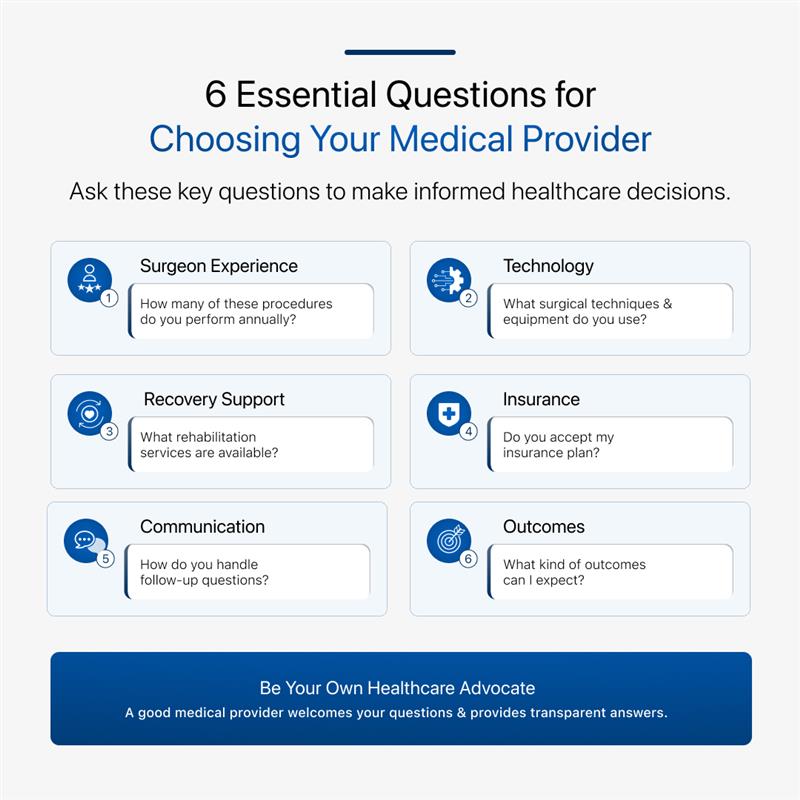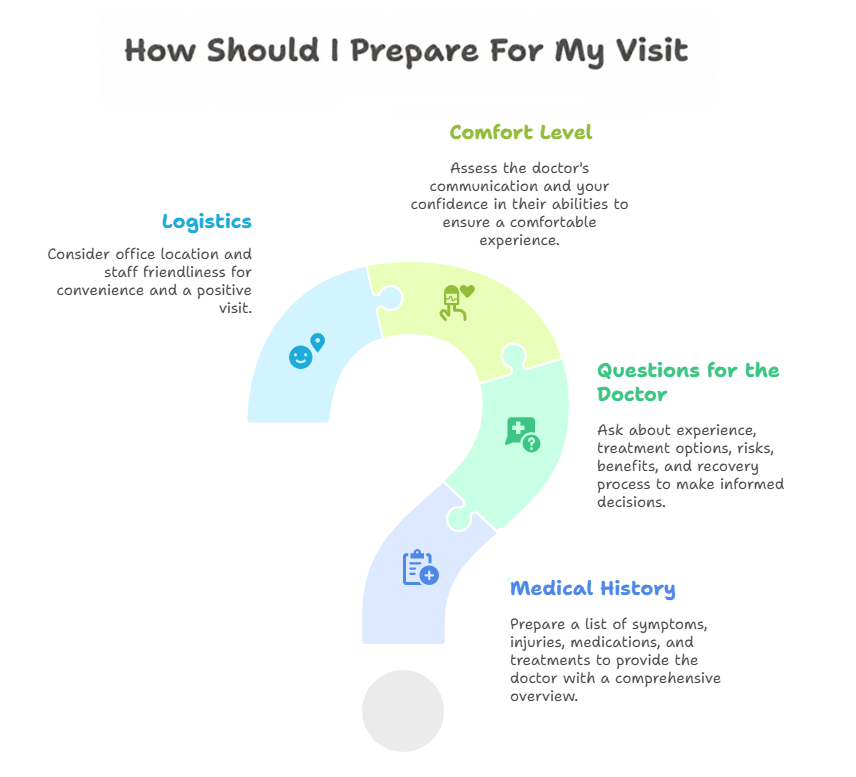Your Ultimate Guide to Finding the Best Orthopedic Doctor in Phoenix
Living with joint or muscle pain can put a major roadblock in your life, stopping you from enjoying the sunny Phoenix lifestyle you love. Whether you’re an athlete recovering from an injury, dealing with arthritis, or experiencing chronic back pain, finding the right doctor is the most important step toward getting back on your feet. But with so many options, how do you choose the best orthopedic doctor in Phoenix for your specific needs?
 This process can feel overwhelming, but it doesn’t have to be. This guide is here to walk you through everything you need to consider, from a doctor’s qualifications to their communication style. We’ll provide you with the tools and knowledge to make a confident decision about your musculoskeletal health.
This process can feel overwhelming, but it doesn’t have to be. This guide is here to walk you through everything you need to consider, from a doctor’s qualifications to their communication style. We’ll provide you with the tools and knowledge to make a confident decision about your musculoskeletal health.
What Exactly Does an Orthopedic Doctor Do?
Before diving into how to choose a doctor, let’s quickly cover what they do. Orthopedics is the medical specialty focused on diagnosing, treating, preventing, and rehabilitating injuries and diseases of the musculoskeletal system. This includes your bones, joints, ligaments, tendons, muscles, and nerves.
An orthopedic specialist can help with a huge range of issues, from a simple sprain to complex spine surgery. They may recommend non-surgical treatments like physical therapy or injections, or they may perform surgery when necessary.
Quote of the Day:
“Medicines can cure diseases, but only doctors can cure patients.” – Carl Jung
Step 1: Identify the Specialty You Need
Orthopedics is a broad field, and many doctors choose to specialize in a specific area of the body or a particular type of treatment. Choosing a specialist who focuses on your specific problem can lead to better outcomes. For example, if you have a torn ACL, you’ll want a doctor who is an expert in sports medicine.
Common orthopedic subspecialties include:
- Sports Medicine: Focuses on the prevention and treatment of injuries related to sports and exercise.
- Joint Replacement: Specializes in procedures like total knee replacement and hip replacement.
- Hand and Wrist: Treats conditions like carpal tunnel syndrome and complex hand fractures.
- Foot and Ankle: Addresses issues from bunions and plantar fasciitis to complex reconstructive surgery.
- Spine Care: Focuses on conditions affecting the neck and back, from herniated discs to scoliosis.
- Trauma: Deals with severe injuries and fractures, often from accidents.
By the Numbers: An estimated 30.5 million orthopedic surgical procedures are projected to be performed globally in 2024, an increase of 4.5% from the previous year. This highlights the growing demand for skilled orthopedic care.
Step 2: Research Credentials and Experience
Once you’ve narrowed down the specialty you need, it’s time to dig into the qualifications of potential doctors. Here’s what to look for:
- Board Certification: This is a crucial indicator of a doctor’s expertise. A board-certified orthopedic surgeon has passed rigorous written and oral exams to prove their knowledge and skills. You can verify a doctor’s certification through the American Board of Orthopaedic Surgery or reputable healthcare websites.
- Fellowship Training: This is extra training a doctor completes in a specific subspecialty after their residency. For example, a doctor might complete a fellowship in spine surgery or sports medicine. A fellowship demonstrates a high level of dedication and expertise in a particular area.
- Years in Practice: While not the only factor, a doctor’s experience can provide peace of mind. A seasoned doctor has likely seen a wide variety of cases, including complex ones similar to yours.
You can often find this information on the doctor’s bio page on their practice’s website, like the detailed physician profiles available at The CORE Institute.
Step 3: Read Patient Reviews and Success Stories
In today’s digital world, online reviews are a powerful tool for finding a great orthopedic doctor in Phoenix. Websites like Healthgrades and Zocdoc provide feedback from real patients. Look for comments about:
- Bedside Manner: Is the doctor a good listener? Do they take the time to answer questions?
- Wait Times and Office Staff: How is the overall experience at the clinic?
- Treatment Outcomes: Are patients happy with their results?
While individual reviews should be taken with a grain of salt, consistent patterns (either positive or negative) can be very revealing. Many practices also share patient success stories on their own websites, which can offer inspiring and detailed accounts of the care provided.
Step 4: Check Hospital Affiliations and Insurance
A top orthopedic doctor will have admitting privileges at reputable hospitals. The quality of the hospital where your surgery would be performed is just as important as the surgeon’s skill. Research the hospitals to ensure they have high standards for patient care and excellent outcomes for orthopedic procedures.
It’s also essential to confirm that the doctor is in-network with your health insurance plan. You can usually find a list of accepted insurance plans on the provider’s website or by calling their office. This simple step can save you from unexpected and significant out-of-pocket costs.
Step 5: Schedule a Consultation
The final and most important step is to schedule an initial consultation. This visit is your opportunity to interview the doctor and see if they’re the right fit for you. Your comfort and confidence in your doctor are critical for a successful treatment journey.
To make the most of this appointment, it helps to be prepared.
Finding the Right Care in Phoenix
Phoenix is home to many excellent orthopedic practices. Institutions like The CORE Institute are known for their comprehensive approach to orthopedic services, from diagnostics and pain management to advanced surgery and physical therapy. They often have teams of specialists under one roof, covering everything from spine care to joint replacement, making coordinated care seamless.
If you need immediate attention for a fracture or sprain, many clinics also offer urgent orthopedic care, allowing you to bypass the emergency room and see a specialist right away.
Frequently Asked Questions (FAQ)
Q: Do I need a referral to see an orthopedic doctor in Phoenix?
A: While some insurance plans require a referral from a primary care physician, many allow you to schedule an appointment directly with a specialist. It’s best to check with your insurance provider first. However, if you know you have an orthopedic injury, going straight to a specialist can often save time.
Q: What’s the difference between an orthopedic specialist and an orthopedic surgeon?
A: All orthopedic surgeons are orthopedic specialists, but not all specialists perform surgery. An orthopedic specialist is trained to diagnose and treat musculoskeletal issues, often focusing on non-operative care like physical therapy or injections. An orthopedic surgeon has additional training to perform surgical procedures. A good surgeon will always explore conservative treatments first.
Q: What should I expect during my first visit?
A: Your first visit will typically involve a detailed discussion of your medical history and symptoms, followed by a physical examination. The doctor may order imaging tests like an X-ray or MRI to get a clearer picture of the issue.
Q: I’m worried about having surgery. What are my other options?
A: This is a very common concern. Most orthopedic conditions can be managed without surgery. Treatments like physical therapy, anti-inflammatory medications, and injections are often the first line of defense. Always have an open conversation with your doctor about your fears and goals.
Your Next Step to a Pain-Free Life
Choosing the right orthopedic doctor in Phoenix is a significant decision, but you now have a clear roadmap to follow. By focusing on credentials, specialization, patient feedback, and your own comfort level, you can find a physician you trust to guide you through recovery.
Don’t let pain dictate your life any longer. Take the time to do your research, ask the right questions, and partner with a medical team that is dedicated to your well-being.
Ready to take control of your musculoskeletal health? The team of dedicated specialists at The CORE Institute is here to help. From diagnostics to treatment and recovery, we are committed to providing world-class orthopedic care. Schedule your appointment online or contact us today to learn more about our services.
- How to Stay Active During Arizona’s Winter: Embracing Low-Impact Movement for Joint Health - January 12, 2026
- Twenty years of CORE from vision to impact and the work still ahead - December 29, 2025
- Deep Vein Thrombosis: A Guide from The CORE Institute - December 3, 2025


